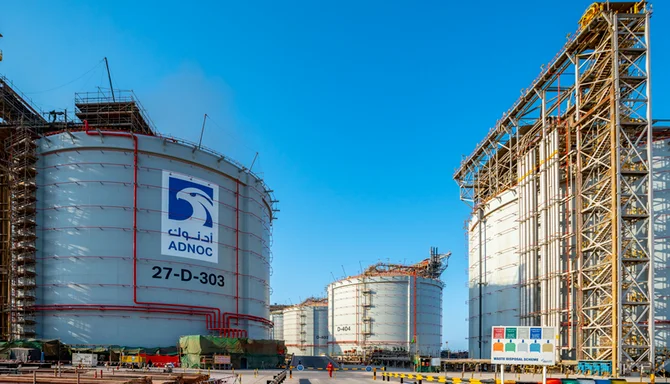The United Arab Emirates is working on transforming its state-owned Abu Dhabi National Oil Company (ADNOC) into a global oil powerhouse. They’re doing this by expanding worldwide and exploring new ways to make more money for their country.
Just like Saudi Arabia and Qatar, the UAE aims to make the most of its oil and gas resources while there’s still a high demand for them. They want to use the money earned from this to make their economy more diverse, reducing their reliance on oil and gas.
ADNOC chose not to comment, and Galp didn’t respond to questions from Reuters.
ADNOC has been quite busy with various deals this year. They acquired a share in a gas field in Azerbaijan, teamed up with BP to bid for a stake in the Israeli gas producer NewMed Energy, initiated takeover talks with the German plastics manufacturer Covestro, and is working on creating a $20 billion chemicals company with Austria’s OMV.
The state-owned company also mentioned that they’re investing in energy trading, although they didn’t provide specific details. Reuters had reported last year that ADNOC was planning to open a trading office in Geneva and a representative office in London.
An ADNOC spokesperson, in response to written questions, stated, “As part of our international growth strategy, we are focused on expanding our presence in renewables, gas, LNG, and chemicals, and are actively pursuing select opportunities, while also investing in and growing our trading capabilities.”
ADNOC has two trading divisions established in 2020: ADNOC Trading, which deals with crude oil, and ADNOC Global Trading, a joint venture with Italy’s Eni and OMV, which focuses more on refined products.
Prominent oil company
ADNOC has been quite active in making deals since 2017 when it listed its fuel distribution unit. However, the real shift in their strategy happened after a board meeting in November, led by UAE President Mohammed bin Zayed.
During this meeting, they decided to speed up their plans to increase production capacity to 5 million barrels per day by 2027. They also gave the green light to a five-year business plan and approved a capital spending budget of $150 billion.
Their goal is to transition from being a traditional state oil company to something more like an international oil company (IOC), as one insider explained.
This transformation mirrors what’s happening at state-owned energy giants in Saudi Arabia and Qatar. These national energy giants, like ADNOC, Aramco in Saudi Arabia, and QatarEnergy, have traditionally focused on oil and gas production within their borders, driving their economies. However, with the growing shift towards renewable energy, they’re under pressure to monetize their reserves faster and explore opportunities beyond their home countries.
To support these changes, ADNOC has been hiring a significant number of staff this year, including senior managers, from various global energy firms, trading houses, banks, and consultancies. LinkedIn data shows that ADNOC’s workforce has increased by 13% this year and by 25% over the past two years, reaching around 32,750 employees. However, the actual number is even higher, with estimates exceeding 40,000, although ADNOC has not officially disclosed this figure.
In response to questions about their hiring spree, an ADNOC spokesperson mentioned, “As we continue to grow our business, we are creating exciting opportunities for our talented workforce as we accelerate the transformation, decarbonization, and future-proofing of our company.”
Experienced recruits
Michele Fiorentino, who served as the chief investment officer from 2017 to 2020, recently rejoined ADNOC after working at the U.S. oil services company Baker Hughes. He now holds the position of executive vice president for low carbon solutions and business development.
Fiorentino reports to Musabbeh Al Kaabi, ADNOC’s head of low carbon solutions and international growth. Al Kaabi, an Emirati, also chairs Mubadala Energy and serves on the boards of several state-linked firms.
Other recent additions to the ADNOC team include Bart Cornelissen, who left Deloitte to take on the role of senior vice president for group strategy and portfolio. Michael Hafner, an experienced investment banker in the energy sector, with prior roles at Greenhill & Co, Deutsche Bank, and UBS, has joined ADNOC as a senior adviser to the executive office for business development.
Some of these new hires have backgrounds at well-known Western firms like Morgan Stanley, HSBC, Natixis, Litasco, Borealis, TotalEnergies, Shell, and Eni, according to LinkedIn.
In ADNOC’s trading divisions, recent senior recruits have connections to companies like Gunvor, Litasco, Shell, and TotalEnergies, as indicated by the employment network.
Notably, ADNOC had been exploring the purchase of energy trader Gunvor Group last year, but the talks fell through because ADNOC was seeking a controlling stake, while Gunvor’s shareholder was only willing to part with a minority stake, according to insiders. Despite this setback, ADNOC remains committed to expanding its presence in Europe, either through organic growth or other means.
Environmental Conference
Despite the rapid changes happening at ADNOC, experts believe that, like its counterparts in Saudi Arabia and Qatar, the company will always have some level of government control.
Neil Quilliam, an associate fellow at the Chatham House think tank, pointed out, “National Oil Companies (NOCs), even if they aspire to be like International Oil Companies (IOCs), are ultimately connected to their governments and must align with the country’s leadership’s goals.” He added that while this is not necessarily a bad thing, it means that ADNOC will always have limitations on its flexibility.
ADNOC’s goal of maximizing oil revenue to support its economic transition faces challenges when considering the global push for a faster transition to lower-carbon fuels and reducing fossil fuel production and consumption. For instance, the United Nations has faced criticism for selecting the UAE, with ADNOC’s CEO Sultan al-Jaber at the helm, to host this year’s COP28 climate summit. Some climate activists argue that this choice might hinder efforts to combat climate change.
However, supporters of Jaber, including U.S. climate envoy John Kerry, believe that his leadership at ADNOC could help bridge the gap in climate discussions and accelerate positive changes.
ADNOC has committed to investing an initial $15 billion in environmentally friendly projects by 2027. Jaber also chairs Masdar, a company in Abu Dhabi of which ADNOC owns 24%. Masdar aims to install 100 gigawatts of renewable energy by 2030, with plans to double that in the future.





